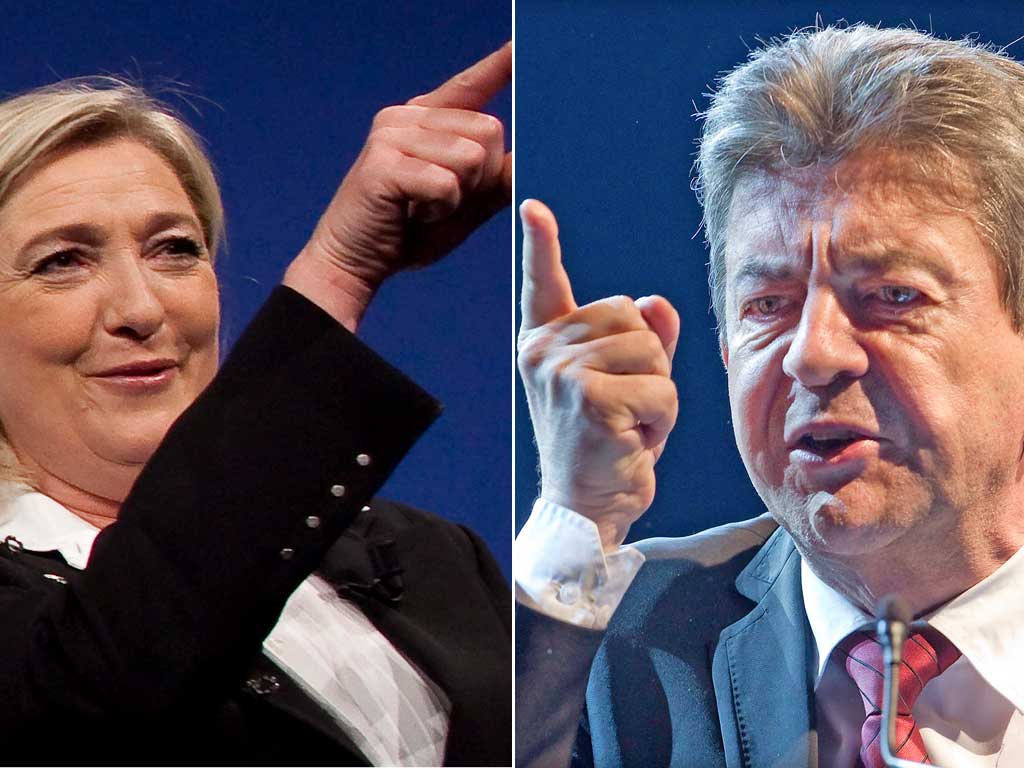No love lost as far-left leader Jean-Luc Mélenchon picks election fight with Marine Le Pen
Jean-Luc Mélenchon takes on the National Front leader in her constituency near Lille

Your support helps us to tell the story
From reproductive rights to climate change to Big Tech, The Independent is on the ground when the story is developing. Whether it's investigating the financials of Elon Musk's pro-Trump PAC or producing our latest documentary, 'The A Word', which shines a light on the American women fighting for reproductive rights, we know how important it is to parse out the facts from the messaging.
At such a critical moment in US history, we need reporters on the ground. Your donation allows us to keep sending journalists to speak to both sides of the story.
The Independent is trusted by Americans across the entire political spectrum. And unlike many other quality news outlets, we choose not to lock Americans out of our reporting and analysis with paywalls. We believe quality journalism should be available to everyone, paid for by those who can afford it.
Your support makes all the difference.Two of the biggest mouths, and biggest egos, in European politics will go head-to-head next month in a small ex-mining town in northern France.
The French hard-left leader, Jean-Luc Mélenchon, has decided to challenge the far-right leader Marine Le Pen in the constituency near Lille in which she has high hopes of winning a seat in parliament on 17 June.
The contest will be a "third place" play-off for the two populist candidates who spent much of this spring's presidential election campaign exchanging insults. Mr Mélenchon called Ms Le Pen a "political yeti" and "semi-demented". He appeared at one stage to have overtaken her in the battle for third place but slumped finally to fourth with 11 per cent in the first round on 22 April.
Ms Le Pen, who scored 17.9 per cent, is trying to laugh off Mr Mélenchon's decision to pursue their personal vendetta into the parliamentary elections. "This is not rage – it's love," she said. "He can't live without me."
Ms Le Pen has been nursing the constituency of Hénin-Beaumont in the Pas-de-Calais for years. She has a seat on the town council and narrowly lost the last contest for a parliamentary seat to a Socialist candidate in 2007. Just south of Lille, Hénin-Beaumont is a typical, small ex-mining town with high unemployment and an entrenched Socialist political machine. The constituency is one of a handful of seats in the National Assembly which the National Front has hopes of winning in the two-round polls on 10 and 17 June.
Mr Mélenchon announced he was standing in Hénin-Beaumont for his Front de Gauche, a coalition of hard-left parties. National Front officials accused him of a cynical act of "parachutage" into a part of France with which he had no connection.
Mr Mélenchon retorted that Ms Le Pen was hardly a miner's daughter. "This area is the cradle of the workers' struggle and Marine Le Pen, who lives in the Château de Montretout, chose to implant herself there," he said.
Ms Le Pen's taunt has an element of truth. Mr Mélenchon defines his success on his ability to reclaim blue-collar workers who have abandoned the left for the National Front. Both are anti-European, anti-market nationalists. The difference, Mr Mélenchon says, is "that she says the crisis is all the fault of the immigrants. I say it's the fault of the bankers".
In the parliamentary elections, any candidate who takes more that 12.5 per cent of the vote can contest the second round. In the first round, Hénin-Beaumont is likely to be a three-way fight between Ms Le Pen, Mr Mélenchon and the Socialist candidate. Under a pact, only the leading left-wing candidate goes forward, so Mr Mélenchon could end up in a head-on contest with Ms Le Pen in the second round.
Join our commenting forum
Join thought-provoking conversations, follow other Independent readers and see their replies
Comments